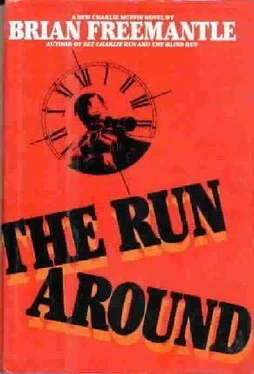Brian Freemantle - The Run Around
Здесь есть возможность читать онлайн «Brian Freemantle - The Run Around» весь текст электронной книги совершенно бесплатно (целиком полную версию без сокращений). В некоторых случаях можно слушать аудио, скачать через торрент в формате fb2 и присутствует краткое содержание. Жанр: Шпионский детектив, на английском языке. Описание произведения, (предисловие) а так же отзывы посетителей доступны на портале библиотеки ЛибКат.
- Название:The Run Around
- Автор:
- Жанр:
- Год:неизвестен
- ISBN:нет данных
- Рейтинг книги:3 / 5. Голосов: 1
-
Избранное:Добавить в избранное
- Отзывы:
-
Ваша оценка:
- 60
- 1
- 2
- 3
- 4
- 5
The Run Around: краткое содержание, описание и аннотация
Предлагаем к чтению аннотацию, описание, краткое содержание или предисловие (зависит от того, что написал сам автор книги «The Run Around»). Если вы не нашли необходимую информацию о книге — напишите в комментариях, мы постараемся отыскать её.
The Run Around — читать онлайн бесплатно полную книгу (весь текст) целиком
Ниже представлен текст книги, разбитый по страницам. Система сохранения места последней прочитанной страницы, позволяет с удобством читать онлайн бесплатно книгу «The Run Around», без необходимости каждый раз заново искать на чём Вы остановились. Поставьте закладку, и сможете в любой момент перейти на страницу, на которой закончили чтение.
Интервал:
Закладка:
‘Going so well?’ It was Harkness who spoke, his voice edged with uncertainty.
‘And about time,’ said Charlie. ‘I think too many mistakes have already been made. I hope we’re not too late …’ He smiled again, directly at Wilson this time. ‘That’s why I’m glad the Soviet surveillance is being maintained: it is something that should have been in place weeks ago. The biggest mistake of all, in fact.’
‘I said I wanted an explanation,’ complained Wilson. ‘I’m not getting it in a way I can understand.’
Charlie recognized there was no longer any anger in the man’s voice. He said: ‘There were a number of reasons for my being what you regarded as antagonistic. It is always necessary, in the first place, to regard any defector as a hostile plant-’
‘You’d already been told that in the opinion of other debriefers Novikov was genuine,’ broke in Harkness.
‘I’m not interested in the opinion of other debriefers,’ said Charlie. ‘Only my own. And having read the transcripts of their sessions and seen the oversights and the errors I didn’t think their opinions were worth a damn anyway.’
‘So what is your opinion?’ said Wilson.
‘I’ve asked this morning for some corroboration, from Moscow,’ said Charlie. ‘But provisionally I think he’s OK.’
‘What other reasons were there for your approach?’ demanded Harkness, fully aware of the unspoken criticism of Witherspoon, who was his protege.
‘Novikov is arrogant,’ said Charlie. ‘Isn’t that obvious from the transcript?’
‘Yes,’ conceded Harkness reluctantly.
‘He’s been handled wrongly, from the start,’ said Charlie. ‘Allowed to dominate the sessions, instead of being dominated himself. I wanted him to know I didn’t trust him: that he had to prove himself. Which he did.’
‘You said mistakes had been made,’ queried Wilson.
‘A lot,’ said Charlie. ‘One of the most serious is the lack of response to the word “catalogue”. It’s not in any of the debriefing guide books, but it is most frequently used by the KGB to cover an agent from their assassination department. Who will be sent in specially. That’s why I mounted the surveillance: I want a comparison between their known operatives and someone we don’t know. If it’s not too late, that is.’
Wilson nodded and said: ‘If you’re right, I agree. But why couldn’t catalogue refer to the victim?’
Charlie shook his head against the qualification. ‘Novikov had encountered the description before,’ he reminded. ‘Both times in connection with an assassination. He refused to be absolutely positive, but his belief was that it’s the code for the operative. And I think the debriefing proved that the operation does not just involve England.’
‘Prove?’ demanded Harkness.
‘Novikov agreed that the cipher division of the KGB is not a general department, that it’s compartmented like everything else,’ said Charlie.
Harkness nodded, in recollection.
‘The assumption by all the previous debriefers had been that Novikov was part of some centralized system,’ insisted Charlie.
‘Yes,’ said Wilson, looking directly at Harkness. ‘And it was a mistake.’
‘I wanted particularly to establish the limitations of what Novikov handled, despite the Politburo clearance,’ disclosed Charlie. ‘The numbering told me.’
‘Number four was his first involvement,’ remembered Wilson.
‘I think I know what happened to the previous three,’ announced Charlie.
‘What?’ asked the Director.
‘Novikov agreed with me that he worked for the Directorate’s Third Department, which we know from previous defectors covers England. The logical conclusion is that the previous messages, perhaps identifying the target, went through other departments,’ said Charlie.
‘Which means the killing could be anywhere in the world!’ exclaimed Wilson.
Charlie shook his head, in another refusal. He said: ‘I think we can narrow it down.’
‘How?’
‘Although separate in department control, England is considered part of Europe,’ said Charlie. ‘My guess is that England is the staging post for a killing that is to be carried out somewhere in Europe.’
‘A guess,’ pounced Harkness.
‘Which might have been easier to confirm if surveillance had been imposed earlier,’ came back Charlie.
‘Why England at all, if the assassination isn’t to be here?’ asked Wilson.
Charlie shrugged, unable positively to answer. ‘It’s trade-craft always to conceal the point of entry,’ he suggested.
‘Everything is still too vague,’ said Harkness.
‘No,’ disputed Charlie again. ‘The debriefing told us how to look. And where.’
‘What!’ shouted Wilson.
‘The dates,’ said Charlie. ‘I’m sure it’s in the dates.’
‘Tell me how?’ insisted the Director.
‘The pattern fits,’ argued Charlie. ‘Novikov was cut off on 19 August?’
‘Yes,’ agreed the Director. He was leaning intently across the desk.
‘The last message he encoded was 12 August?’
‘Yes.’
‘Before that, 5 August?’
‘And you anticipated the first, 29 July,’ remembered Harkness.
‘All Fridays,’ said Charlie.
There was another brief silence, then Harkness said: ‘So?’
‘The Politburo of the Union of Soviet Socialist Republics always convenes on a Thursday,’ said Charlie. ‘Novikov’s first message, to the Politburo, was an acknowledgement of an instruction for a public and political assassination. The other two were outwardly transmitted messages, establishing London as a link in that planning.’
Harkness shook his head in rejection. ‘I don’t agree that assumption,’ he said. ‘Or still understand the guide it gives us, even if I could accept it.’
‘Allow me the assumption,’ urged Charlie. ‘We’ve got three unknown messages, before Novikov was given his, numbered four in the sequence. So let’s work backwards, from those dates. If I am right, then the assassination was discussed at three previous Politburo sessions, 22 July, 15 July and 8 July, with 8 July being the date of the initial concept.’
‘I am finding this as difficult to follow as Harkness,’ protested the Director. ‘But if I do allow you the assumption, I still don’t see what we have got.’
‘“The need is understood that a political, public example has to be set, for the maximum impact,”’ quoted Charlie.
‘I don’t need reminding of the first cable,’ said Wilson.
‘How about the last?’ asked Charlie. ‘“You will wrap the November catalogue.”’
‘What’s the connection?’
‘What political, public event, where something of maximum impact could possibly be achieved, was announced just prior to but certainly not after 8 July?’ suggested Charlie. ‘A political, public event scheduled to take place in November?’
‘Oh yes,’ accepted the Director, finally. ‘Oh yes, I could go for that.’
‘It’s a theory,’ allowed Harkness, grudgingly.
‘The best we’ve got, after the mistakes so far,’ said Charlie.
‘I think so, too,’ agreed the Director, at once.
‘I’m glad,’ said Charlie. ‘I was late for this morning’s meeting because I’ve ordered from every British embassy in every European capital a complete list and breakdown of major political happenings in their countries throughout December as well as November just to be sure. I designated it maximum priority, with a copy in each case to the ambassador.’
‘In whose name?’ asked Wilson, expectantly.
‘Yours,’ said Charlie.
Harry Johnson was pissed off, right up to the back teeth: five weeks to go before retirement, the lump sum he’d decided to take from his pension already deposited on the holiday bungalow in Broadstairs, the extra plot negotiated to his allotment and this had to happen, a hands-over-your-bum, watch-everything-that-moves red alert. It wasn’t fair: certainly the assignment wasn’t fair because the buggers had manoeuvred it so he got the worst surveillance of the lot, the one most likely to go wrong. And the last thing he could afford was anything going wrong: until the gold watch that had already been selected and the insincere speeches and the booze-up in the Brace of Pheasants. All he’d wanted — could surely have expected! — was a quiet, easy life, so that he could quit the service with a reasonably good record. Not this, something that was so obviously important and even more obviously dangerous.
Читать дальшеИнтервал:
Закладка:
Похожие книги на «The Run Around»
Представляем Вашему вниманию похожие книги на «The Run Around» списком для выбора. Мы отобрали схожую по названию и смыслу литературу в надежде предоставить читателям больше вариантов отыскать новые, интересные, ещё непрочитанные произведения.
Обсуждение, отзывы о книге «The Run Around» и просто собственные мнения читателей. Оставьте ваши комментарии, напишите, что Вы думаете о произведении, его смысле или главных героях. Укажите что конкретно понравилось, а что нет, и почему Вы так считаете.












